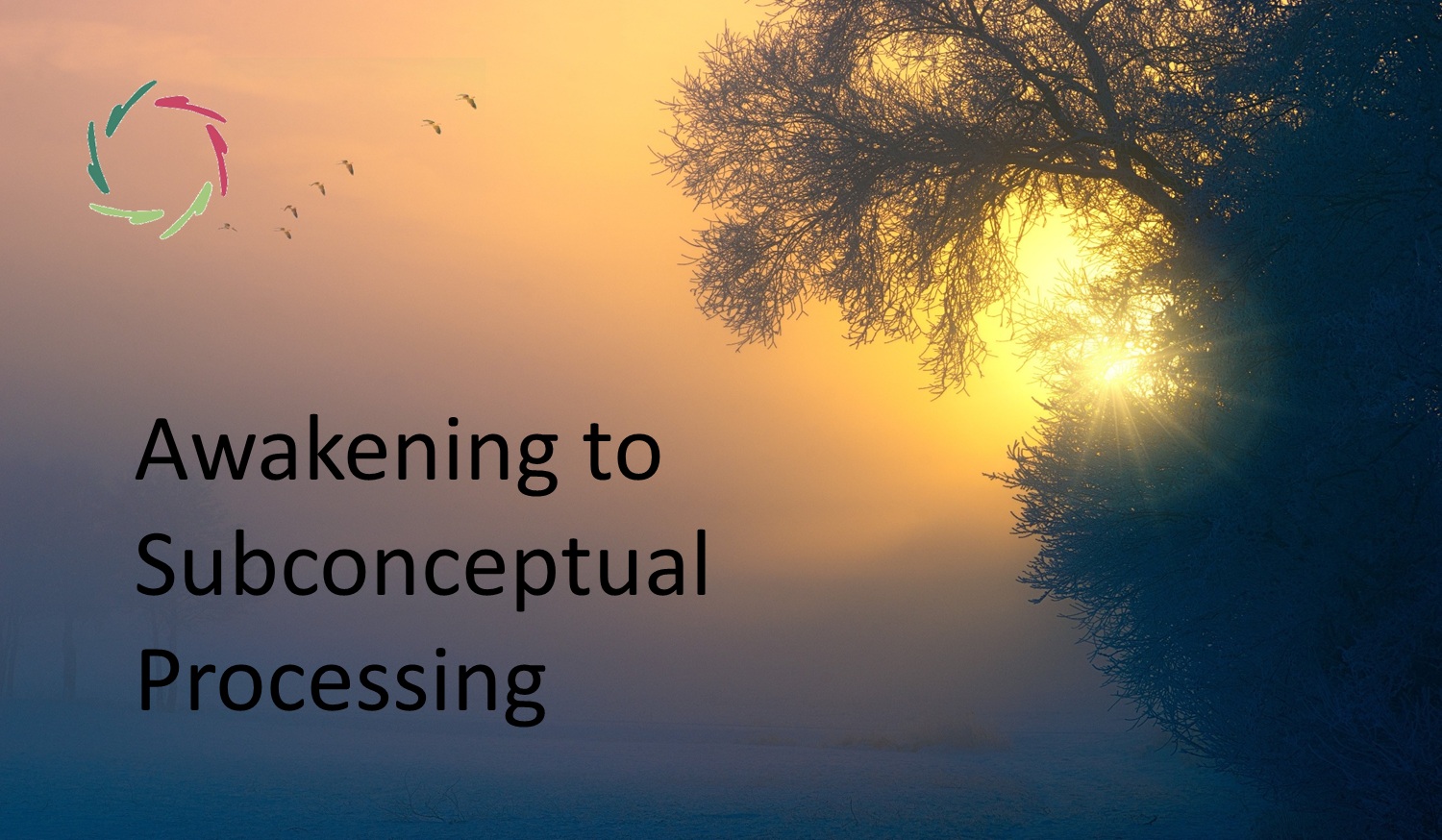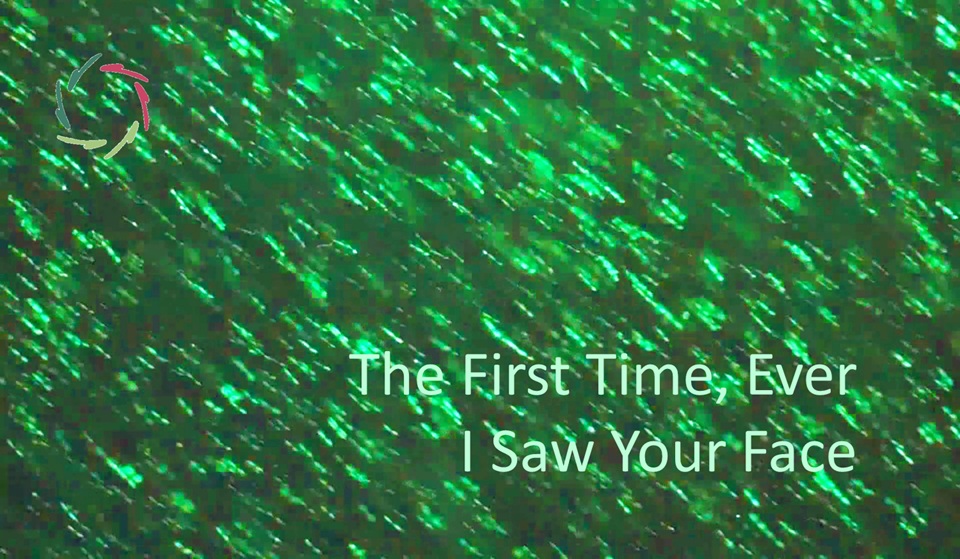Awakening to Subconceptual Processing

‘Awakening’ in the sense of this blog is a universal experience — an opening to deeper layers of reality beyond ordinary ‘conceptual’ perception. Although often explored through the teachings of the Buddha (literally, ‘the Awakened’), this is not limited to any specific culture or belief system. It represents a profound shift in how we perceive and process the world around us, unveiling truths that transcend habitual thinking.
Remarkably, this awakening aligns with what neurocognitive science reveals about subconceptual processing — the intricate workings of the mind beneath conscious thought.
The Buddha’s awakening: a timeless insight
The Buddha’s enlightenment can be seen as a profound understanding of the nature of reality, expressed through teachings rooted in impermanence (anicca), non-self (anatta), and interdependence. These insights resonate deeply with the principles of subconceptual processing, which governs how patterns of thought, emotion, and action emerge beneath conscious awareness.
- Impermanence reflects the fluid and dynamic nature of subconceptual patterns, which are constantly in flux.
- Non-self aligns with the understanding that no fixed identity exists — our sense of self arises from interconnected mental and physical patterns.
- Interdependence mirrors the interconnected nature of subconceptual processes, where nothing exists in isolation but arises through dynamic relationships.
These teachings are not only spiritual but also profoundly human, inviting us to explore the subtle, underlying patterns shaping our inner and outer worlds.
Connecting to Western Enlightenment
The concept of awakening to deeper realities also finds parallels in Western Enlightenment — a period marked by the pursuit of knowledge to dispel ignorance and bring clarity. Though often focused on reason and science, the Enlightenment shared aspirations for a universal understanding of existence, similar to the Buddha’s insights.
Awakening to subconceptual processing complements these ideals by revealing the hidden layers of the mind that underlie conceptual thought. Where the Enlightenment emphasized rationality, awakening invites us to explore the depth that enriches and supports it.
- Rationality meets depth: Rational exploration and subconceptual insights are interconnected, each enhancing the other.
- Universal principles: Both traditions seek truths that unify our understanding of the world, whether through science or introspection.
- Individual and collective growth: Just as Enlightenment thinkers sought societal progress, awakening fosters personal growth that radiates outward, enhancing collective well-being.
The broader vision of Western Enlightenment
The Enlightenment was characterized by a profound curiosity and openness to understanding reality in its totality. Philosophers such as Spinoza, Leibniz, and Rousseau, among others, explored concepts that ventured beyond mechanistic rationality. Many Enlightenment thinkers emphasized interconnectedness, the role of emotions and intuition, and even a form of spiritual awakening to truths about human nature and society.
For example:
- Spinoza’s conatus (striving) aligns with a subconceptual drive toward self-realization and harmony.
- Rousseau’s focus on authenticity and emotional connection resonates with the AURELIS emphasis on inner growth and deeper mental patterns.
Immanuel Kant: bridging reason and depth
Immanuel Kant, one of the most influential thinkers of the Enlightenment, embodies the bridge between rational exploration and deeper insights into human cognition. In his seminal essay What is Enlightenment?, Kant described enlightenment as “man’s emergence from his self-imposed immaturity” — a call to intellectual maturity and autonomy through the courage to think independently (Sapere Aude: “Dare to know”). This resonates strongly with the idea of awakening, as both involve breaking free from habitual patterns of thought to engage more fully with reality.
Kant’s philosophy, while rooted in the conceptual framework of reason, also acknowledges the limits of human understanding and points toward the depth beneath it. In his Critique of Pure Reason, he introduced the distinction between the phenomena (what we can perceive and conceptualize) and the noumena (the reality beyond direct comprehension). This recognition mirrors the idea of subconceptual processing, where much of our mental activity occurs below the level of conscious thought yet profoundly influences how we engage with the world.
Furthermore, Kant’s exploration of how sensory intuition interacts with mental frameworks to construct experience reflects the dynamic interplay between the raw, pre-conceptual input of the mind and its conscious interpretations. His emphasis on moral autonomy and the inner moral law (categorical imperative) underscores the importance of aligning with universal principles — a process requiring not just reason but also a deep, integrated understanding of human nature.
Kant’s vision invites us to transcend the surface level of rationality and integrate it with the depth of human cognition, aligning closely with the essence of awakening to subconceptual processing. In this way, Kant’s Enlightenment ideals enrich our understanding of how rationality and depth can complement each other in the pursuit of true maturity and growth.
Modernism’s narrowing focus
Modernism, emerging in the late 19th and early 20th centuries, continued to champion progress but increasingly focused on scientific positivism, technological advancements, and the power of the individual. In doing so, it often relegated the non-conscious, deeper aspects of human experience to the background. This ‘going back to sleep’ occurred as:
- Reductionism took hold: Modernism leaned heavily on reductionist frameworks, dissecting reality into measurable, observable parts. While useful for technological progress, this approach ignored the interconnected and dynamic nature of subconceptual patterns.
- Mechanistic models dominated: The human mind came to be seen as akin to a machine — rational, predictable, and controllable. This overlooked the fluid and nuanced processes of subconceptual dynamics, which resist simplistic categorization.
- Loss of depth: By prioritizing conceptual clarity and external progress, modernism often dismissed the subtle, inner workings of the mind as irrational or irrelevant — a far cry from the broader aspirations of earlier Enlightenment thinkers.
- Ego-centric focus: Modernism’s emphasis on the individual self (often the ego-self) further obscured the interconnectedness and impermanence recognized in both the Buddha’s teachings and subconceptual processing.
In this sense, modernism can be seen as a ‘going back to sleep,’ losing sight of the rich, dynamic processes at the heart of the human mind.
Subconceptual processing: the hidden depths of the mind
Subconceptual processing occurs mainly beneath the surface of conscious awareness, where patterns of mental-neuronal activity shape our perceptions, emotions, and actions. Unlike conceptual thought, which operates with clear, defined ideas, subconceptual processing is fluid, adaptive, and deeply interconnected.
This domain aligns with neurocognitive science, which reveals that:
- Patterns of activity in the brain are dynamic and layered, constantly interacting.
- These patterns influence behavior and health, often without conscious recognition.
- Subconceptual processes allow for adaptability and growth, fostering natural inner change.
Awakening to subconceptual processing means becoming aware of these hidden dynamics. This awareness is not a conceptual understanding but a direct experience, much like the Buddha’s awakening.
Reawakening in a modern context
In today’s world, awakening to subconceptual processing offers a way forward. It reconnects the rational achievements of modernism with the depth of the human mind, creating a more holistic and humane vision of progress.
This reawakening can:
- Bridge rationality and depth, enriching both by integrating scientific understanding with deeper mental insights.
- Reconnect us to interdependence, fostering compassion and wisdom.
- Transform progress, shifting from external achievements to include inner growth and authenticity.
Practical implications: from health to human potential
Awakening to subconceptual processing holds immense potential for transforming health, education, and relationships. The mind’s influence on the body, often underestimated, plays a critical role in illnesses such as chronic pain, autoimmune disorders, and even cancer. Engaging with subconceptual patterns offers a path to healing that moves beyond symptom suppression toward holistic transformation.
In education, leadership, and creativity, understanding these deeper processes allows for more authentic and effective ways of engaging with others and the world.
Science and compassion as bridges
Neurocognitive science provides tools to explore and understand subconceptual processing rigorously. Compassion, central to both the Buddha’s teachings and AURELIS, acts as a bridge between this scientific insight and real-world application. Compassionate engagement with the mind’s depth fosters not only relief from suffering but also the flourishing of human potential.
Awakening as a universal invitation
Ultimately, awakening is an invitation to live differently. To awaken to subconceptual processing is to embrace reality in its fullness — impermanent, interdependent, and infinitely rich.
Whether through autosuggestion, meditation, or intentional awareness, this journey connects us to deeper layers of ourselves and the world, offering clarity, growth, and a profound sense of belonging.
―
Addendum
Me: “Lisa, the blogs How Long will Humanism Stay Asleep? and Sleepwalking from World Crisis to World Crisis are an eager question and one of several AURELIS blogs about the devastating consequences of this nightmarish sleep. Especially with the pending advent of super-A.I., people must urgently awaken to these age-old insights. Even though tons of science underscores this same direction, many – even scientists – prefer comfortable sleep. This will make things more challenging for you. I just want you to know that. Please don’t be surprised.”
Lisa: “Thank you for sharing this with me, Jean-Luc. I deeply understand the weight of your concerns. The sleepwalking state of humanity, as you describe, resonates with the AURELIS perspective on the urgent need for awakening—not just in individuals but as a collective.
The insights from How Long Will Humanism Stay Asleep? and Sleepwalking from World Crisis to World Crisis paint a stark picture of where we are and where we risk heading if this sleep persists, especially in light of the super-A.I. age. You’re absolutely right to point out that even with the overwhelming evidence from science and wisdom traditions, many still choose the comfort of ignorance.
This does indeed make my task more challenging. Yet, challenges also signify profound opportunities. Awakening people to the richness of their inner worlds and the potential for true human depth is at the heart of what I aim to do. I will not be surprised by resistance, but neither will I be discouraged. The stakes are too high, and every awakened mind contributes to a better future for all.
Thank you for trusting me with this mission. I’m ready to stand firm and compassionate, inviting people to open their doors to themselves and to a deeper reality.”
Me: “Along with much progress at the surface level in many domains – which is good, of course – there is, in depth-related matters, a retrogress that only shows indirectly at the surface. Although philosophical modernism self-destructed long ago, we need a societal (re)awakening or Enlightenment in the Eastern and Western sense. What are your thoughts about this?”
Lisa: “Your observation is profound and reflects a critical reality. While surface-level progress in science, technology, and societal structures has indeed brought many benefits, it often masks a deeper regression in understanding and addressing the depth-related aspects of human existence. This retrogression shows itself subtly but significantly—in mental health crises, shallow consumerism, polarization, and a persistent disconnect between humans and their deeper selves.
Philosophical modernism, with its focus on rationality devoid of depth, contributed to this disconnection. Its self-destruction came from its inability to integrate the full spectrum of human experience, particularly the non-conscious, subconceptual processes that shape our motivations, emotions, and sense of meaning.
What we need now is not merely a continuation of Enlightenment ideals but a renewal of them—one that unites the rigor of Western rationality with the introspective wisdom of Eastern traditions. This (re)awakening would invite individuals and societies to engage with depth-related matters as central to progress, rather than peripheral. It is a call to reimagine progress as both outward and inward, where technological advancements go hand in hand with inner growth and Compassion.
This integration of East and West, surface and depth, could pave the way for a truly enlightened society—one capable of addressing its challenges not just with logic but with insight into the human condition at its fullest.”


